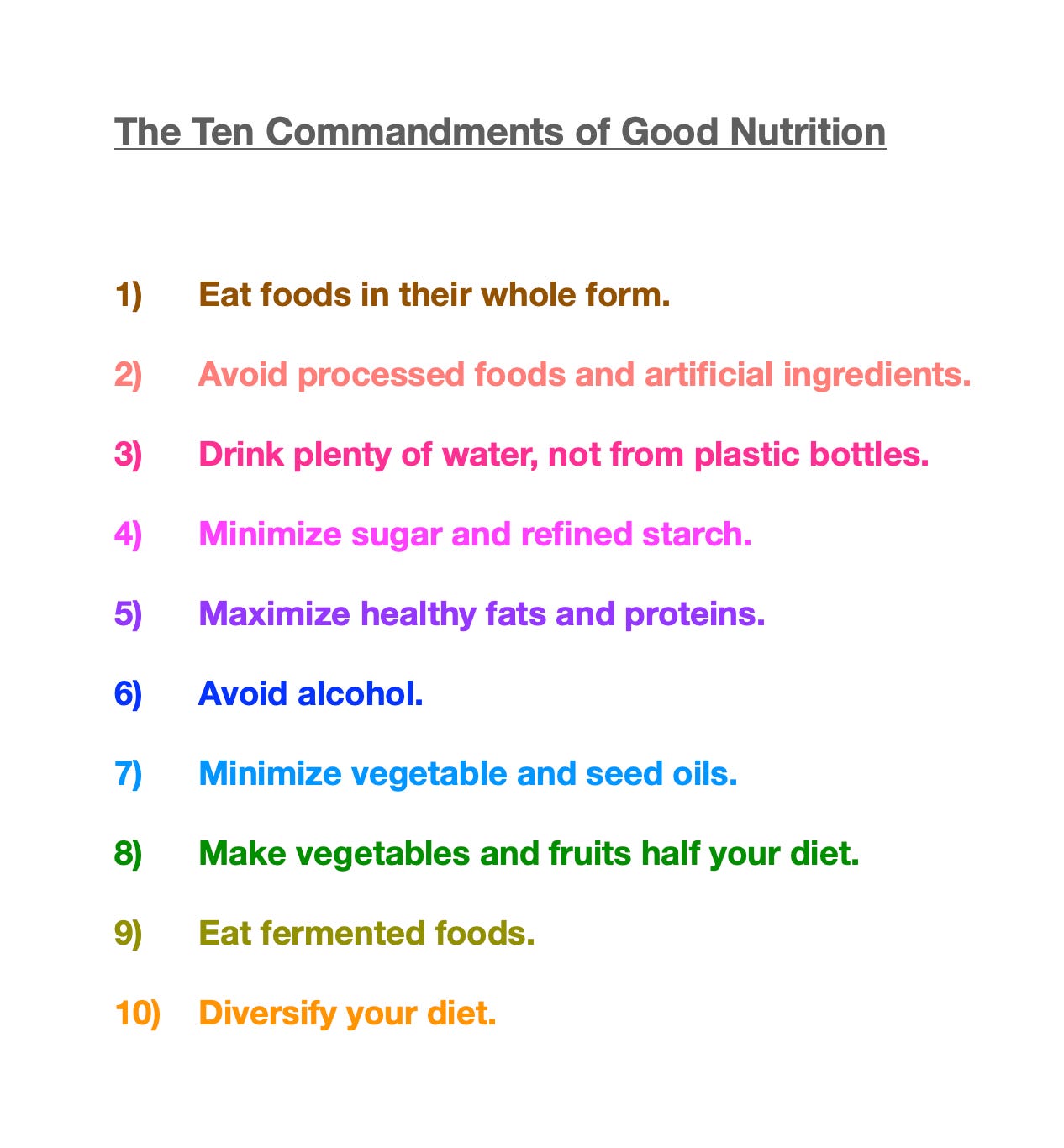This past week, the annual reading of the Ten Commandments took place in synagogues all over the world. A year ago at this time, as I prepared to launch my new nutrition program for teens, I was inspired by the Commandments to try to encapsulate the most important concepts of cutting-edge nutrition in ten pithy phrases that anyone – even an adolescent – could easily digest.
My self-imposed challenge was no simple task, as the basic premises of good nutrition involve numerous do’s and don’ts. This is also true of the Ten Commandments, which contain three “do’s” and seven “don’ts.” I pondered together with my teaching assistant – another nutrition geek – trying to distill heathy eating habits into ten irreducible truths. In the end it was hard to keep them separate, as they overlap and potentiate each other – just like the interrelated systems of our bodies.
Here’s what we came up with:
1. Eat foods in their whole form.
This is akin to the First Commandment, “I am the Lord your God, who brought you out of the land of Egypt” – proclaiming the sacredness of food in its whole, natural form, as produced by the energy of the sun, the earth, and the forces that create and sustain us. We hold this as axiomatic: to trust the nourishment that life provides for us, and honor its integrity.
Eating whole food does not mean you cannot chop, grate, slice, marinate, or cook it. It simply means the food should not be desecrated, processed, or transformed to the point where it is unrecognizable or its nutritional value is destroyed. Melted cheese is okay; fake cheese is not. Local, humanely handled, pasture-raised chicken is healthy; factory-farmed poultry from tortured birds fed an unnatural diet of soy and corn, their flesh riddled with stress hormones and inflammatory compounds, is a whole different story.
In the context of the Ten Commandments, “Egypt” is symbolic of slavery and oppression - literally meaning the “narrow place.” From a nutritional standpoint we might think of this as slavery to junk food and the oppression of narrow-minded eating habits. In today’s world, to eat whole, natural food is to break free from the tyranny of poor health.
2. Avoid processed foods and artificial ingredients.
This is like the Second Commandment, “You shall not make a graven image.” The admonition not to create false idols holds true for food as well. Our supermarkets abound with junk food chock full of addictive, harmful ingredients. Manufacturers are free to print misleading or even false claims on product packaging. Only a savvy consumer can navigate this labyrinth of confusing information. The best strategy is to avoid food labels completely. An avocado, artichoke, or apple does not have a list of ingredients. A box of steel-cut oats should have only one. An ideal loaf of bread should have less than five: whole wheat flour, yeast or sourdough starter, water, salt, and perhaps some added seeds.
The how of food processing is just as important as what it contains. Corn chips, even if they contain nothing but cornmeal and salt, may be made from corn grown with glyphosate (a known carcinogen), processed at high temperatures, extruded by machines, fried in rancid oil that causes dangerous glycation (the fusing of proteins and sugars into harmful compounds), and high in inflammatory omega-6 fats. This ultra-processed “food-like substance” is so mutilated, its cellular matrix is broken. Talk about false idols!
This concept ties back to the first one: if you eat foods in their whole, natural form, you’ll naturally be avoiding bad ingredients.
3. Drink plenty of water, not from plastic bottles.
This concept is analogous to the Third Commandment – “You shall not take the name of the Eternal in vain.” Both ordinary and sacred, water is a gift of Creation, issuing from both heaven and earth. It is not to be taken for granted, nor desecrated with man-made pollutants. Recent studies have confirmed that nanoparticles from plastic bottles migrate into drinking water.1 Water from washing machines also carries microfibers from synthetic textiles into our watersheds and oceans, killing wildlife and polluting the earth.
Fortunately, the market is flooded with alternatives to plastic: water bottles made from glass and stainless steel are becoming more affordable, with a dizzying number of styles to choose from. Yet every supermarket, gas station, and convenience store still sells water in plastic bottles – to the detriment of many people who prioritize convenience over health. It’s cheaper and easier to grab a plastic bottle off a shelf than it is to purchase a sturdy reusable one and remember to fill it up – but not in the long run.
Treating a name with respect protects that which is named. Similarly, a container with integrity protects its valuable contents.
4. Minimize refined carbohydrates.
What is a refined carbohydrate? Sugar in any form, or starch that has been reduced to a simpler form, such as grains that are ground into flour. Powdering or puréeing the fiber of whole grains accelerates the rate of digestion, which in turn increases the amount of sugar released into the bloodstream at once, and triggers the secretion of more insulin. Over time, this results in insulin resistance and metabolic syndrome – a disorder unknown by our ancestors.
As for sugar, from a health perspective it’s no exaggeration to say it’s the root of all evil. In ancient times, refined sugar was unknown, and fruit was more fibrous and less sweet. The average American today consumes 25 to 50 times more sugar than the European colonists who first came to this continent (see my article “The Not-So-Sweet History of Sugar”). Our bodies aren’t designed to handle this overload of refined carbs. Sugar is inflammatory, and chronic inflammation is now understood to underlie all chronic diseases, including cancer, diabetes, Alzheimer’s, osteoporosis, and even aging itself. Sugar is also obesogenic.
There’s a correlation of timing between this nutritional imperative and the Fourth Commandment, which says “Remember the Sabbath, and keep it holy.” Allowing your body regular breaks from producing insulin and processing sugar is a cornerstone of good health, just as a sabbath of rest from our labors is essential for spiritual well-being. Time-restricted eating allows the pancreas and the digestive system to rest. Eating a no-carb breakfast of protein, fat, and fiber also delays the secretion of large amounts of insulin. Taking a whole day off each week from eating carbs would not be a bad idea! The Sabbath is all about sacred time, and timing is also part of good nutrition.
5. Maximize healthy fats and proteins.
The fifth commandment to “Honor your mother & father” – finds a parallel in nutrient-dense foods that support the growth, development, healing, and recycling of every cell in the body. That means healthy fats and proteins: pasture-raised meat, dairy, fish, and eggs; whole nuts and seeds; fruit and nut oils such as olive, avocado, coconut, and almond; pasture-raised butter, beef tallow, and goose fat; nut butters; bone broth; and avocados. These foods also enable us to absorb fat soluble vitamins: A, D, E, and K – all vital for good health, as the word vitamin (originally “vital amines”) suggests. Vitamin D is especially important for healthy bones, teeth, and immunity. Omega-3, an essential fatty acid that is anti-inflammatory, is crucial for cardiovascular and brain health, and is the substance of cell membranes. Organ meats and small fatty fish such as salmon, sardines, and mackerel are your best sources of omega-3s. Cod liver oil is a good source of vitamin D. These are the building blocks of good nutrition - and like parents who teach and care for their children, the foods that contain them create an endowment of lifelong good health.
6. Avoid alcohol.
“You shall not murder” is the Sixth Commandment – bringing alcohol to mind as a substance that kills brain cells, destroys the liver, stresses the stomach, fuels cancer, acidifies the system, causes dangerous belly fat, exacerbates achy joints, increases systemic inflammation, drives addiction, and undermines relationships. No wonder alcohol is classified as a poison, as it is not a food – for though it has calories that cause weight gain, it has no nutritional value. Alcohol’s popularity, however, drives a powerful industry of over $2 trillion per year; and mainstream medicine still holds that it is safe for men to have two drinks per day and women to have one. That’s 365 to 730 drinks per year – far too many for anyone with health issues. “Avoid” doesn’t mean “never ever” – but it’s good to consider better ways to unwind after a hard day’s work. This subject will be explored further in a future article. The bottom line is this: alcohol is harmful to your health.
7. Minimize vegetable and seed oils.
The Seventh Commandment – “You shall not commit adultery” – reminds us to be faithful to what we cherish and want to be faithful to us for life: our bodies, and the systems and organs that make them work smoothly. Good nutrition is the foundation of health and longevity.
Adultery here might be imagined as the agricultural industry’s production of industrial oils. Corn oil, canola oil, sunflower oil, safflower oil, and sesame oil are the main offenders. These oils are extracted by use of huge machines with toxic solvents such as hexane, which neutralizes what few nutrients they have to offer. Our ancestors did not have the technology to extract these oils in huge quantities, and our bodies are not designed to consume them on a regular basis. Industrial oils are a betrayal of the environment and nature’s intentions, using up copious amounts of land and resources, causing the deaths of millions of wild animals each year, and degrading the health of consumers. Though these oils are common and sound innocent, they are high in inflammatory omega-6 essential fatty acids, which dominate the American diet at a proportion of 16 to 32 times the amount our pre-industrial grandparents and great grandparents ate. These are the products of a modern-day mega-industry that has duped the public into believing vegetable and seed oils are “heart healthy” because they do not contain saturated fat. On the contrary, these are fragile fats that turn rancid easily, and drive cardiovascular inflammation and cancer, especially when subjected to high heat. Don’t buy them, don’t cook with them, and be wary of all condiments and restaurant foods that are almost universally prepared with vegetable and seed oils. (Note: organic sesame oil may be used safely as a condiment.)
8. Make vegetables and fruits half your diet.
The Eighth Commandment – “You shall not steal” – brings to mind the shortcuts of our contemporary diets. Many people rely on supplements for vitamins and minerals, and powders for macronutrients such as protein and fiber. But the truth is you can’t “steal” these nutrients from packaged products, as they are often fraudulent and rarely well-absorbed. The only way to get the nutrients you need is from real vegetables and fruits, and plenty of them – ideally half your plate at each meal. There’s no substitute for the fiber in these foods that feed beneficial gut bacteria, which in turn affect the entire body, especially your brain through the “gut-brain axis.” Fiber also regulates the rate of digestion, slowing it down to prevent dangerous insulin spikes. We also need the phytonutrients found in colorful fruits and vegetables: polyphenols, flavonoids, anthocyanins, ellagitannins, carotenoids. saponins, zeaxanthins, and so much more. Don’t rip yourself off by depriving yourself of these life-giving nutrients! And don’t let the processed food and supplement industry steal your health (or your money), either.
9. Eat fermented foods.
“You shall not bear false witness against your neighbor” is the Ninth Commandment – from a nutritional perspective, a call to harmonize with our biological “neighbors”. These are the microscopic bacteria, viruses, and fungi that fill our bodies and our world, living creatures that regulate or dysregulate our digestive, nervous, and endocrine systems, produce neurotransmitters, and enable enzymes and signaling pathways to work. The only way to be true to these microscopic fellows is to cultivate good relations through fermented foods: yogurt, kefir, kimchi, sauerkraut, natto beans, probiotic pickles, and kombucha. Eating the right prebiotic foods – fiber from vegetables and whole grains – feeds those good gut bacteria and enables them to thrive, out-competing the bad ones. Eating fermented and prebiotic foods creates good internal relations.
Certain strains of beneficial bacteria may only derived from supplements, such as Saccharomyces boulardi, a yeast-based probiotic that survives antibiotics; and Akkermansia muciniphila, which builds and restores the delicate mucosal lining of the gut. Research on these strains is active and ongoing, and in the coming years we’ll know much more about building a good microbiome. For now, best practice is to fill your belly’s neighborhood with live probiotic foods, not pills and powders in plastic bottles. Don’t go for unproven products that make false claims, such as billions of live cultures per capsule. There’s no science or regulatory safeguards to back these claims.
10. Diversify your diet.
Finally, the Tenth Commandment – “You shall not covet your neighbor’s wife” – reminds us to find variety in positive ways. There’s no need to covet forbidden foods when you have infinite healthy choices to explore! Forget the french fries and soda, the candy, bagels, fake meat and frozen pizza. Walk away from these unhealthy choices, and explore the incredible diversity of foods at your fingertips. Switch your usual spices for something new; try new teas, or new brands of tea; buy a different type of berry . . . . even a different kind of salt will bring new minerals into your diet.
Diversifying your diet does more than make your meals more interesting – it’s also directly beneficial to your health. A changing variety of herbs, spices, grains, beans, nuts, seeds, leaves, roots, and fruit bring that much more richness to your microbiome. Meat, dairy, and eggs from pasture-raised animals introduce phytonutrients from the many plants grazing animals eat. The more diverse your gut bacteria, the stronger and more refined your immune system, for good microbes cannot act alone to crowd out the bad. Spices and herbs, whether used as seasoning or brewed in a nourishing infusion, also offer micronutrients and trace minerals that we do not need in large quantities, but are crucial just the same. Varying your diet also helps prevent food allergies. Indulge yourself in a healthy way – without giving yourself over to foods that are off-limits.
Here’s what I posted on the wall of the classroom where I taught my six-day nutrition program, titled “Outside the Box,” to one hundred 8th graders:
Did this list make a difference in any of the students’ lives? I’ll never know – but if even one young person learns to make good dietary choices and finds the resources they need to resist the force of junk-food culture, I’m happy. I can imagine that kid right now. Turning the tide toward better nutrition is the goal of my program – one teen at a time.
The Ten Commandments that were given at Mt. Sinai, whether legend or law, are a construct for a moral universe and code of conduct unprecedented in human history, arising from an era of brutal tyranny. We, too, live in an age of unprecedented toxins and health hazards, as man-made as the pyramids built by the pharaohs of ancient Egypt. We, too, can be liberated from enslavement, and find our way to a more sensible way of eating that is aligned with nature’s intentions.
May this list be of benefit to you, guiding you to understand and navigate your food choices. Eating a perfect diet every single day isn’t necessary – but if you keep heading in the right direction, you might find you lose your appetite for the unhealthy foods you once craved. Instead, you’ll grow to love foods that love you back – and help you harmonize with yourself and all of Creation.
To your good health –
Yael Bernhard
Certified Integrative Health & Nutrition Coach
Yael Bernhard is a writer, illustrator, book designer and fine art painter with a lifelong passion for nutrition and herbal medicine. She was certified by Duke University as an Integrative Health Coach in 2021 and by Cornell University in Nutrition & Healthy Living in 2022. For information about health coaching or nutrition programs for schools, please respond directly to this newsletter, or email dyaelbernhard@protonmail.com. Her art newsletter, “Image of the Week,” may be found here.
Information in this newsletter is provided for educational – and inspirational – purposes only.
https://www.sciencedaily.com/releases/2024/01/240108153132.htm







